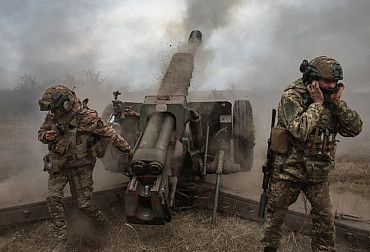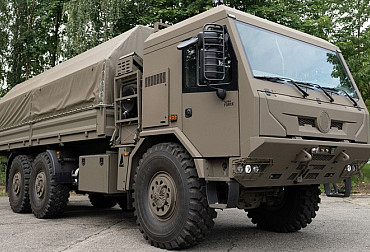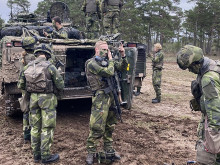Entry of contractors and their possible use also for the Czech Armed Forces
A contractor is basically a natural or legal person (even a private company) that provides its services (activity) for a fee. In the military sphere, persons contracted for hire were referred to exclusively as mercenaries. However, the status of the contractor is different in some respects. Although there are a number of views on the definition of a contractor, including different approaches for their use, I believe that the following view reflects recent developments in the world. Ultimately, different countries and entities adjust the rules for the designation and deployment of contractors to suit their needs.

The term contractor is also used in other professions where the reason for the contract is also the interest in the qualification or ability to perform the required tasks/tasks. Contractors today are focused on specific types of activity and are often true specialists in their field. These contractors are currently contracted not only by various private companies but also by governmental or non-governmental companies. It is also for this reason that there is a desire to make the activities and status of contractors in military areas as legal as possible, especially where national interests are at stake.
What is the main motivation for contractors to go to fight for money? Very often it is the financial reward, but not infrequently it is also the habituation to this way of life, where ties to their fellow combatants, often comrades with whom they have already experienced a lot, play a role.
Use of contractors
As part of the acquisition of the necessary capabilities, some civilian companies are being used whose services may be useful for the fulfilment of the tasks of the armed forces. This includes, for example, the provision of training or logistical support to troops in military exercises and operations, including the supply of fuel, water, ammunition and other military materiel. Some companies also offer shipping and air transport or rail transport of military material.
In many cases, we could say that this is a classic use of 'outsourcing', where it is costly for the state, and hence for the military, to maintain a large range of capabilities in peacetime. In some cases, it is also difficult from a personnel point of view, with some specialisations the army is not even able to acquire. The fact is that many of the personnel employed by 'contractors' of various specialisations have previously served in the armed forces or security forces, which makes it easier for them, thanks to their previous experience, to perform their new 'jobs' at a high professional level. Examples from the recent past include the use of US contractors in Iraq or Afghanistan, where their main activities included the aforementioned logistical support tasks. Other activities that are not much talked about include the use of contractors for various covert operations or operations with which their principals do not want to be associated.
Another part of contractors is used for combat operations or activities with a high risk to life. In the context of contractor deployments in Iraq and Afghanistan, Blackwater, founded by former Navy SEALS member Eric Prince in 1997, is probably the best known. The "Wagner Private Military Company" named after Dmitri Utkin, called Wagner (after his favorite composer), has also come to prominence. In reality, it was Yevgeny Prigozhin's private military. After his rebellion and subsequent death, the Wagnerites were partially integrated into the Russian army and, for example, in Africa, were subordinated to the Russian Ministry of Defence. At present, the numbers of these contractors in Africa under the so-called "Africa Corps" are gradually increasing and may reach several tens of thousands of people. Their presence and their links with military dictators in particular have contributed significantly to the erosion of France's presence and influence in a number of African countries, such as Mali, Burkina Faso and Niger.
Advantages of their deployment
In the case of the use of combat units composed of contractors, their casualties are usually not even publicised and do not have such an impact on the public opinion of the state they are fighting for. Otherwise, citizens would no doubt react to the losses of mobilised soldiers. Another advantage is their possible largely covert use in the conduct of combat operations or to paralyse enemy forces and influence. For example, actions against the local government or hostile sentiments against various entities can be incited. We can say that these units can be an important tool for conducting hybrid warfare. However, their covert activity also responds to the requirements of the contemporary battlefield and the demands for dispersal of independent units that carry out initiative and professionally assigned tasks. Larger counterinsurgency units, which could be likened to battle groups, can have a very high combat value, especially for their professionalism, but also for their determination to achieve the assigned task in order to gain rewards for the work done. Moreover, their deployment is not so constrained by various military regulations or other processes within the military structures. The 'freestyle' of the contractors can thus respond with greater flexibility to changes on the battlefield and their often very efficient functioning represents an important advantage compared to other branches of the armed forces.
There are now reports of foreign nationals being deployed in Ukraine, on both opposing sides, with many risking their lives for money and others choosing to assist according to their moral or other convictions. Some are also fighting because they have already "smelled" the military trade before and are looking for further self-fulfilment. In many cases, it is a combination of these motivations.
After the end of the conflict in Ukraine, it is expected that there will be an interest in using professionals who have undergone combat experience in various fields, including the use of new technologies. It is also likely that 'fighters' used to a risky way of life will find employment. In return for good financial remuneration, the client will probably be able to choose. Perhaps already today some entrepreneurs in the various security and protection services, as well as companies that arrange for contractors to be sent to risky areas, are creating new business plans. It can also be assumed that many war veterans will engage in illegal activities with the prospect of high profits. In this context, it is very likely that one of these activities will be the smuggling of weapons, which will be readily available in Ukraine.
Call for the Army of the Czech Republic
Given the inadequate numbers of reserves, including their insufficient professional level, there may come a time when we in the Czech Republic will also consider the creation and use of contractors. Already today, legal services from private companies are used for larger and more complex contracts within the Ministry of Defence, for example in the implementation of the acquisition process. Contractors can thus become, especially in the context of the requirements for specialised services and the lack of in-house capabilities, an important part of building resilient defence structures also in the case of the Czech Republic and the Czech Armed Forces. The use of contractors can significantly contribute to increasing the capabilities of the armed forces and influence the nature of warfare and conflict management. However, in terms of reliability, this may pose a security risk, especially in terms of changing interests (e.g. due to financial rewards). However, the risks can be reduced through legislation, good contracts and other measures. The Czech Republic/CRC could thus, among other things, in the context of the security situation in the world, acquire or increase the necessary defence capabilities at this critical time, in accordance with the requirements for efficiency, effectiveness and economy in the use of its available financial and human capacities.





















